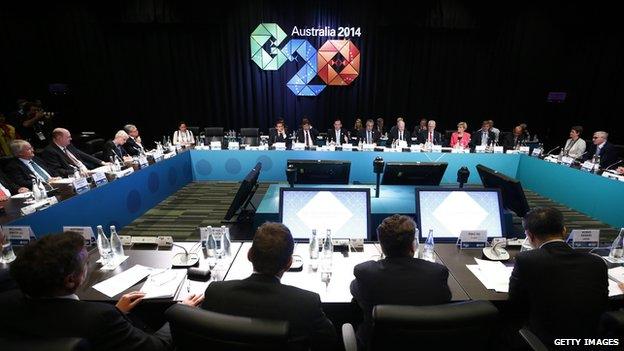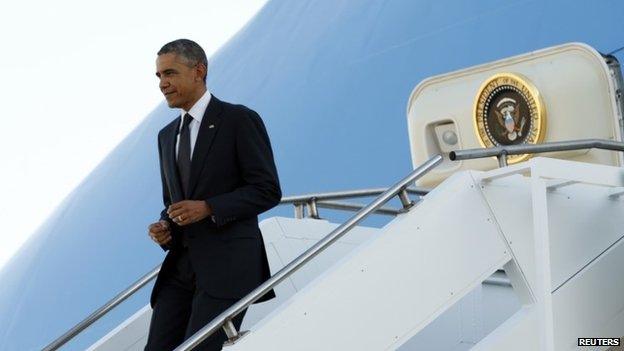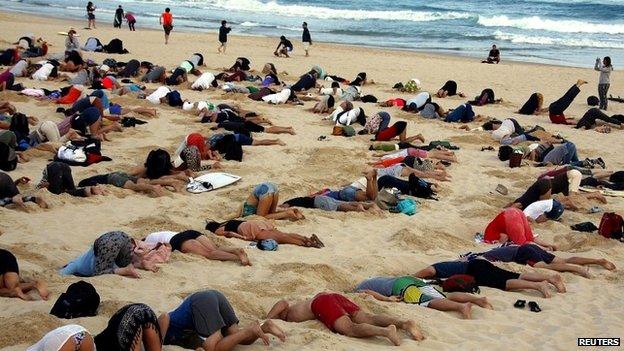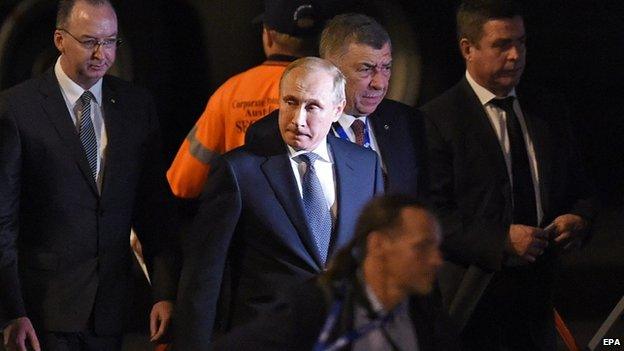G20 summit: World leaders meet in Brisbane
- Published

Leaders of the G20 nations are expected to focus on economic growth
World leaders are meeting in Brisbane, Australia, for the first day of the G20 summit.
The two-day summit, attended by the US, Chinese and Russian leaders among others, will focus on promoting growth.
In a speech, US President Barack Obama sought to reassure Asia-Pacific allies of the US' commitment to the region.
Vladimir Putin is expected to face a hostile reception from some Western leaders concerned about Russia's increasing military assertiveness.
Speaking ahead of the G20 summit, the Russian president said US and EU sanctions imposed over Russia's actions in Ukraine would harm not just Russia but the global economy.
What is the point of the G20 summit? In 90 seconds
Meanwhile, President Obama said the US believed that security in the Asia-Pacific region must depend on international law and the peaceful resolution of disputes.
"We believe... that any effective security order for Asia must be based not on spheres of influence, or coercion or intimidation where big nations bully the small, but on alliances for mutual security, international law and norms that are upheld, and the peaceful resolution of disputes," he said.
Australian Prime Minister Tony Abbott previously said world leaders would use the summit to discuss job creation, identifying tax cheats and strengthening the global economy.
Leaders are expected to expand on plans agreed in February at the G20 finance ministers' meeting to boost global economic growth by 2% in five years.
However the crisis in Ukraine and the threat of Ebola are also expected to be discussed at the summit, while campaigners want climate change on the agenda.
"Obviously I would like this discussion to focus on the politics of economic reform," Mr Abbott said as he opened the session on Saturday.
"In the end, though, this is your retreat, it is open to any of you to raise any subject that you wish."

Barack Obama arrived in Brisbane early on Saturday following earlier stops in China and Myanmar
The BBC's Linda Yueh in Brisbane says that while the global economy is the official focus of the summit, the agenda is likely to reflect what the people around the table are concerned about - including Ukraine, the spread of Ebola and climate change.
Our correspondent says the question will be how much can be achieved by leaders of the G20 nations with so much to discuss in just two days.
In early developments:
British Prime Minister David Cameron has outlined new measures to tackle jihadists who fight abroad, in an address to the Australian parliament
Japanese Prime Minister Shinzo Abe called for closer tripartite defence ties with the US and Australia, and urged "tangible steps taken in the area of security and defence cooperation" with Canberra, in a piece for the Australian Financial Review, external
Brisbane, in the state of Queensland, is said to be taking unprecedented security measures for the summit, with some 6,000 police deployed.
Twenty-seven different groups have been given permits to protest at designated areas near the Brisbane Convention and Exhibition Centre, the venue hosting the meeting, and thousands of people are expected over the weekend.

Protesters took to Sydney's Bondi Beach to make a statement about the global climate change debate
More than 200 protesters buried their heads in the sands of Bondi Beach on Thursday in a demonstration over climate change inaction.
Earlier in the week, the US and China made what US President Barack Obama described as "historic" pledges on emissions, with the US promising greater cuts and China for the first time setting a date by which emissions would peak.
Australia has, however, stood firm on keeping climate change off the agenda of the G20 summit.
The government is facing criticism over its climate policies. Since coming to power, Mr Abbott has axed a carbon tax and overseen a 70% fall in investment in renewable energy.
The G20 summit will discuss world trade - as ever - but many other key subjects including Ebola appear missing.

Vladimir Putin is expected to face a hostile reception from some Western leaders
Eyes will also be on President Putin, amid tensions over Russia's role in Ukraine. Some Australians had called for Mr Putin to be blocked from the summit over the downing of Malaysia Airlines flight MH17.
Thirty-eight Australians were among the 298 people who died when the plane was brought down over rebel-held eastern Ukraine, by a missile that the West believes was supplied by Russia. Russia rejects the claim.
Mr Abbott, who discussed the issue with Mr Putin in Beijing earlier this week, described Russia's actions in Ukraine as part of a "regrettable pattern" by a nation that was being "much more assertive".
He said he told Mr Putin that Russia should aspire to be a superpower "for peace and freedom and prosperity" instead of "trying to recreate the lost glories of tsarism or the old Soviet Union".

What is G20?
The "Group of Twenty" represents two-thirds of the world's population, 85% of global GDP and over 75% of global trade.
It began in 1999 as an annual meeting for finance ministers and central bank governors following the Asian financial crisis, before evolving to also include a summit for countries' leaders in 2008, after the global financial crisis.
G20 meetings are aimed at deepening economic co-operation and strengthening the global economy.
It comprises 19 countries and the European Union, external.
At each meeting, the host country invites non-member guest countries to attend. For 2014, Australia has invited Spain, Mauritania, Myanmar, Senegal, New Zealand and Singapore.